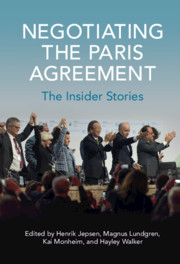Book contents
- Negotiating the Paris Agreement
- Negotiating the Paris Agreement
- Copyright page
- Contents
- Figure
- Editors
- Contributors
- Acknowledgments
- Foreword
- 1 Introduction
- 2 The Paris Negotiations: Background and Context
- 3 The French COP 21 Presidency
- 4 Mission: Adoption with Ovations: The Contribution of the UNFCCC Secretariat to the Achievement of the Paris Agreement
- 5 The Paris Agreement and China’s Imprint
- 6 The EU’s Role in the Paris Agreement
- 7 The United States: Interesting Processes and Techniques Lined the Road to Paris
- 8 COP 21 – Complaints and Negotiation: The Role of the Like-Minded Developing Countries Group (LMDC) and the Paris Agreement
- 9 The Staircase of Paris
- 10 The Battle for Small Island Developing States
- 11 The High Ambition Coalition
- 12 The Power of Civil Society
- 13 Business: Creating the Context
- 14 Why Did They Finally Reach Agreement?
- 15 Conclusion: The Landscape of Multilateral Agreement in Paris and Beyond
- Afterword
- Appendix: The Paris Agreement
- References
- Index
15 - Conclusion: The Landscape of Multilateral Agreement in Paris and Beyond
Published online by Cambridge University Press: 24 September 2021
- Negotiating the Paris Agreement
- Negotiating the Paris Agreement
- Copyright page
- Contents
- Figure
- Editors
- Contributors
- Acknowledgments
- Foreword
- 1 Introduction
- 2 The Paris Negotiations: Background and Context
- 3 The French COP 21 Presidency
- 4 Mission: Adoption with Ovations: The Contribution of the UNFCCC Secretariat to the Achievement of the Paris Agreement
- 5 The Paris Agreement and China’s Imprint
- 6 The EU’s Role in the Paris Agreement
- 7 The United States: Interesting Processes and Techniques Lined the Road to Paris
- 8 COP 21 – Complaints and Negotiation: The Role of the Like-Minded Developing Countries Group (LMDC) and the Paris Agreement
- 9 The Staircase of Paris
- 10 The Battle for Small Island Developing States
- 11 The High Ambition Coalition
- 12 The Power of Civil Society
- 13 Business: Creating the Context
- 14 Why Did They Finally Reach Agreement?
- 15 Conclusion: The Landscape of Multilateral Agreement in Paris and Beyond
- Afterword
- Appendix: The Paris Agreement
- References
- Index
Summary
The editors and Frauke Ohler conclude the book by reflecting on what the insider accounts teach us about the negotiation of the Paris Agreement. The first part provides a comprehensive examination of the combination of factors that led to the adoption of the Paris Agreement. It discusses the relative contribution of the multitude of factors identified in the previous chapters, ranging from the structural context set by geopolitics and macroeconomics, to how non-state actors reshaped the normative landscape, to the importance of individual personality. The second part of the chapter distills practical lessons learned. It identifies seven key elements of effective negotiation management, including the importance of transparent communication, good handling of informal dialogues, and leveraging non-party stakeholders. Finally, the chapter concludes by contemplating some risks and opportunities that mark the discussion about global governance in the post-Paris era. Next to a discussion about the implications of regionalization and digitalization of negotiations, it argues that, while some may be tempted to view the Paris Agreement as an end-point, climate negotiations will continue.
- Type
- Chapter
- Information
- Negotiating the Paris AgreementThe Insider Stories, pp. 314 - 338Publisher: Cambridge University PressPrint publication year: 2021
- 1
- Cited by



